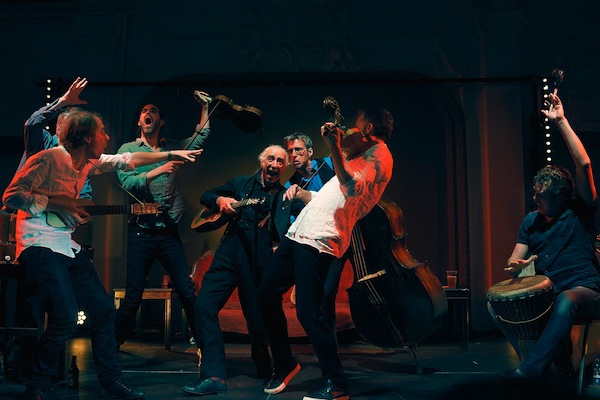UC Presents opens season with a musical night at a 17th-century pub
The Norwegian baroque ensemble Barokksolistene kicked off the University of Chicago Presents’ 2017-18 season Friday night in the Assembly Room of International House. The first stop on their inaugural U.S. tour, Barokksolistene performed a program entitled “An Alehouse Session,” which made for an unexpected and singularly entertaining evening.
Barokksolistene is a consort consisting of strings, baroque guitars, and harpsichord that was founded in 2005 and performs under the direction of “bandleader” and violinist Bjarte Eike. “The Alehouse Sessions” is the group’s signature project, a dynamic exploration of the artistic culture of the 17th-century English pub.
This project was born of a specific historical time and place. The Commonwealth in England began in 1649 following the Second English Civil War and execution of Charles I. In 1653 Oliver Cromwell ascended to become Lord Protector of the Commonwealth, and the Puritan Cromwell shut down England’s theaters and music halls, leaving thousands of unemployed artists looking for work in London. (“Just like today!” Eike quipped, in amusing commentary that ran throughout the evening.) These artists came together in England’s various public houses (whence “pubs”) where their craft was collectively vitalized to such an extent that pubs remained centers of culture well after the restoration of the monarchy (and the theaters) with Charles II in 1660.
It would be impossible to recreate exactly what such evenings were like, and “An Alehouse Session” doesn’t aspire to do so. Rather, the idea is to capture something of the overall feel of such Commonwealth-era gatherings. Assuming Barokksolistene is historically on target, these evenings were rich in merriment and exceptional musicianship.
To start the evening the Barokksolistene players entered from the back of the hall playing an air and interacting with audience members—exchanging greetings, hugs, and cheers—as they processed to the stage. Once there the players, dressed in untucked button-downs, cracked open waiting cans of beer (apparently people in the period regularly drank 8-10 pints over the course of their days), in a show of informality that typified the whole affair.
After some humorous introductory remarks from Eike, the group began with Purcell’s 1695 song “A Hole in the Wall” (also the name of the oldest pub in England, which dates from 1540). Here as throughout the night the group performed without music, and maintained impressive ensemble given that all of the players moved more or less freely about the stage. They also have a consistently comely, robust consort sonority, with greater dynamic range than one sometimes finds with baroque groups.
Musically most of the program consisted in “sets,” and the Purcell was followed by one of these called the “Washerwoman Set,” which consisted of tunes from The English Dancing Master (compiled in 1651 by John Playford). The ensuing set comprised the “Curtain Tune” from Purcell’s Timon of Athens, an air from the same composer’s The Fairy Queen, and ended with a Norwegian folk tune. A convincing slow-motion pantomime of a bar brawl among the players separated these sets, and such thespianism was as important to the show’s success as its expert music making. The “Spanish Set” and “Virgin Queen Set” were similarly made up of evocative airs and dances from myriad sources that were performed in an adept, theatrical manner.
Among the members of the Barokksolistene consort was the guitarist, actor, and dancer Steven Player, who made a splash headlining the Newberry’s Consort’s season opener last fall. He leant his inimitable terpsichorean flair to the proceedings, periodically taking the spotlight for some authentic solo dances. In the second half he was the star of a quasi-skit about “the four kinds of drunkards,” which entailed him persuasively pretending to vomit into the harpsichord, and pantomiming urinating at the back of the stage.
One of the benefits of the evening was the diversity of activity onstage—dancing, singing, acting, string instruments tapped on percussively—that one never got bored. Two hours plus of 17th-century airs could easily run the risk of tedium, but with Barokksolistene’s superlative playing, amusing antics, and generally welcoming mien, this was never the case.
University of Chicago Presents continues with a recital by violinist Leila Josefowicz and pianist John Novacek 7:30 p.m. November 3 at Mandel Hall. The program features Sibelius’ Valse Triste, Prokofiev’s Violin Sonata No. 1 in F Minor, Saariaho’s Calices, the Adagietto from Mahler’s Symphony No. 5, and Bernd Alois Zimmermann’s Sonata for Violin and Piano. chicagopresents.uchicago.edu/
Posted in Performances


